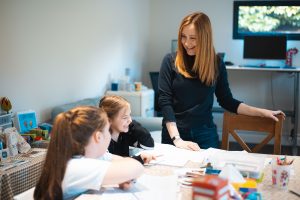I’d like to discuss why I think it’s useful for children to learn about creative writing from an author, but first, I’m going to start by telling you about my favourite part of the creative writing process.

Initially, it’s exciting when an idea comes to me. When this happens, it’s like an itch I can’t help but scratch. It won’t go away until I’ve fully formed the idea, plotted and planned the story.
First, I like to know all about the characters, who they are, what they look like, their likes, dislikes, etc, all before I start anything. This brings them to life in my head and in a way, it helps them, to help me, to write the story (do I sound crazy yet?)
Knowing what makes the characters tick, helps with subplots too. They need to have ‘real’, every day lives going on at the same time as the main conflict of the story, otherwise, neither the story nor the characters would feel real. The characters are also affected by their surroundings, so I like to be clear about where the story will be set.
All this, before I’ve even begun to lay out the main plot points of the story.
So much planning goes into a novel, before I start to write it. Personally, I believe this is necessary, otherwise it’s so easy to get lost somewhere along the way. I don’t always end up sticking rigidly to the plan (it’s those characters with a mind of their own dictating the way), but having it there as a guide, scaffolding, if you like, really helps. By the time I come to the actual writing, I know pretty much what I’m going to write and by this point, I know my characters and their lives so well, it feels natural to write their story. Of course, I do tend to find out more about them as the story progresses, but I’m 85% of the way there before I start.
This is what makes the writing process so enjoyable for me. For that time, the duration of the writing, I can almost lose myself in another world. This is a world of my own creation and I can immerse myself in it whilst shutting everything else out. The Japanese call this Ikigai, or ‘flow’, where it’s just you and your creative process, nothing else matters.
This is how I write. My writing process. It’s a creative process, something I find joy in doing. Have you noticed, not once have I made any reference to verbs, nouns, connectives, adverbs, frontal adverbials?
I have a fundamental understanding of grammar, of course I do. I must have been taught it in school, yet I don’t remember being taught it, or how. One thing’s for certain though, I never construct a sentence by thinking about how to put words together so that they make grammatical sense. It’s a subconscious act, yet this is how many children think of the process of writing. They are so hung up on the grammar that they fail to see beyond it, to the story they are creating, to what the words they are putting together actually mean.
Unlike them, I can see past this in order to let the story flow from me and on to the page. It’s part of my role as a creative writing tutor for kids, to help them to do this too.
Another thing I find children struggle with, is the complexity of their ideas. Some read at a level that is beyond their writing capabilities. Others are influenced by games, which I believe, are too old for them. This means, when it comes to story ideas, these children come up with complex plots and sub-plots, with a host of characters they have no idea what to do with. I have to encourage them to simplify their ideas, so that can write them down.
A third thing children find difficult, is the idea of a story having a beginning, middle and end. It’s classic story telling, right? And we’re all taught this. It’s often depicted as a story mountain, which is a great visual. The difficulty comes, however, with the children knowing how to climb that mountain, then once at the top, being able to get back down again.
I help to simplify this process by giving children the tools to make that climb and descent.
It’s a constant struggle, because many children feel they will never be good enough. But my aim, is to put the fun back into writing. I want them to enjoy the process, just like I do, and find the magic that comes from creating something that’s all yours.
I can’t stress enough to the children how important it is to get the story out of their heads and onto paper without worrying about anything else. This is what editing is for. If the grammar’s not great, we can correct that. No one expects their first draft to be perfect, and that includes me. It takes many drafts before a story is considered ready for publication.
This is why I believe working with children, from an author’s point of view, is important for developing creative writing techniques. What do you think?
Find out more about my creative writing club by visiting the Storymakers website.

0 Comments